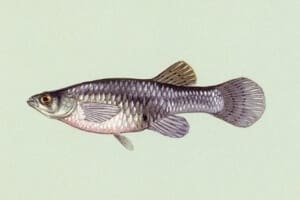Mosquitofish are available at no cost for Jackson County residents
 Limit 1 fish per foot length of pond or water feature, up to 25 total
Limit 1 fish per foot length of pond or water feature, up to 25 total
JCVCD maintains two mosquitofish (Gambusia affinis) breeding ponds at our District office and provides them free of charge to Jackson County residents. These fish, similar in size and proportion to guppies, are small but voracious predators that can consume hundreds of mosquito larvae per day. They are very hardy and do well in water troughs, abandoned swimming pools, stock ponds, and ornamental fish ponds.
General Information and Care of Mosquitofish
Mosquitofish readily feed on mosquito larvae but also consume a wide variety of insects, plant materials, fish fry, and other small aquatic organisms. They will also readily consume most commercial fish foods.
Mosquitofish can survive in a variety of environments but generally do best in ponds or water features where water levels remain at least 12 inches in depth, temperatures don't get extremely hot or cold, and where structure, like plants and rocks are available for harborage. This is particularly important if there are larger, predatory fish present. They are prolific reproducers, giving birth to live young rather than laying eggs. They will generally reproduce quickly provided there is adequate structure available for young fish to hide.
Restrictions on Placement
Mosquitofish are a non-native species. Oregon law (ORS 498.222) and the Oregon Department of Fish and Wildlife (ODFW) stipulates where certain non-native fish, including mosquitofish, can be placed. This is intended to mitigate negative impacts to native species. ODFW restricts the stocking of mosquitofish to “aquaria", which is defined as self-contained waterbodies and tanks not fed or drained by natural waterways. Natural waterways include creeks, streams, sloughs, ponds, lakes and any ditches connected to them. Permanent ponds located in floodplains should also not be stocked since floodwater could allow mosquitofish to enter natural waterways.
